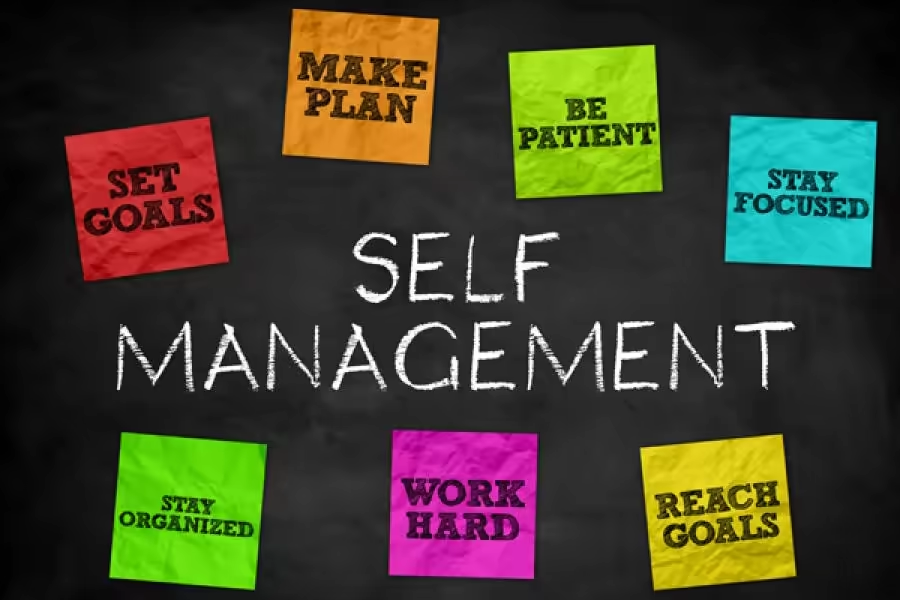Management is not just for managers, just as leadership is not only for leaders. According to the World Economic Forum (WEF) on the Future of Jobs, there is a need for people to build on self-management and critical thinking skills, so that we can harness an increase in automation and a looming COVID-triggered recession, to usher in a new wave of jobs that take advantage of both automation and human creativity and adaptability. The COVID-19 pandemic has brought a change in how businesses operate, some jobs are even at risk of becoming redundant, so there is a need for workers and leaders to adapt to the new trend. This can be done by harnessing new skills such as Self-management. Research has shown that over 90% of business leaders see critical thinking, problem-solving, and self-management as increasingly or equally critical skills leading up to 2025.
What is Self-Management?

Self-management in companies and organizations is no longer a mystery and is starting to be discussed in corridors and offices. Success (2015) defines Self-Management as a combination of behaviors that focus on how people manage themselves in their work and their life. According to author and science journalist Daniel Goleman and his co-authors, self-management consists of the following six traits: self-control, transparency, adaptability, achievement, initiative, and optimism. Self-management means taking responsibility for your actions and doing things as well as you can. It shows you can organize yourself and offer your ideas to any project. It’s about being the boss of YOU, not the boss of a team or company!
Self-managed people are self-disciplined. Those with high levels of self-management skills systematically plan their approach to goals, employ the right tool for the job, identify blocks to their performance, and modify their approach and practices. They are aware of their strengths and weaknesses and possess a broad range of context-independent process tools (generic skills, practices, optimally effective and efficient work routines) from which they select the most appropriate.
In his book How to Be a Star at Work, Robert Kelley highlights the following critical elements of Self-Management:
- Committing to lifelong learning in support of both the organization’s goals and your own goals
- Learning how to make certain that your projects add value to the organization
- Developing your productivity skills to manage both your time and your commitments
- Building broad personal networks that allow you to tap expertise in and out of the organization for complex problems
- Being willing to embrace change and rethink both organizational structures and work definitions as new opportunities arise
Kelley emphasizes that star employees are intrinsically managing both their work and their career. By providing high value to the organization, stars get more opportunities to select which projects they work on and are instinctively building new skills to further their career prospects.
Self-Management Skills
The ability to self-manage allows one to maximize productivity, improve workplace performance, and efficiently achieve professional goals. According to the Indeed career blog, Self-management skills focus on personal responsibility in the following areas:
- Organization: Being well organized, allows one to be able to plan, prioritize, and execute important activities, helping you to self-manage your essential workplace responsibilities.
- Goal setting: Goal setting in the workplace helps you to decide what’s important and to create an action plan that will help you achieve goals that align with those values. This skill is necessary to maintain productivity in the workplace because it enables you to manage your time and actions.
- Time management: Strong time management skills allow you to prioritize tasks, avoid distractions, and maintain focus. Effective time management in the workplace helps with setting and meeting deadlines, working on one thing at a time, and delegating responsibilities appropriately. Managing one’s time is an essential part of self-management.
- Self-motivation: Self-motivation is the ability to take initiative and finish tasks you know should be completed. When you’re self-motivated, you anticipate and plan for potential tasks needed to achieve more significant assignments or to solve ongoing issues. You’re driven by your desire to succeed and not by outside factors, which makes you more productive in the workplace. Self-motivation is the side of self-management that ensures forward progress with your projects and activities.
- Stress management: Proactively managing workplace stressors can help you remain calm on the job. Handling stress before it becomes an issue allows you to focus on your goals and make steady progress forward. Managing stress helps you self-manage your emotions and maintain a professional demeanor in the workplace.
- Accountability: Accountability is the act of taking personal ownership of your thoughts and actions. When you maintain responsibility, you’re better equipped to evaluate your work and determine the best way to proceed.
Robert Kelley also highlights the following as core skills of Self-management:
- (1) Learning to manage your commitments and time;
- (2) Cultivating the motivation and capability to learn new things on your own in support of your work;
- (3) Building and nurturing your network. With those three skills, you will be successful, though they may not make you a star.
Building self-management skills at work will help you:
- Turn up on time to important meetings and bring anything you might need (that counts for job interviews too!)
- Take pride in your work and get recognized as someone who tries and cares
- Do your tasks better because you prepare in advance when you need to
- Seek out opportunities for work experience, training, and more.
Why is Self-Management Important?
Bastos (2020) outlines the following reasons why Self-management is important:
- Better Performance
Ernst and Young conducted a study covering a self-managed organization called Buurtzorg that works in the service of home care. This organization was compared with other traditionally managed organizations, the results showed that self-management decreases the recovery time of treated patients by an average of 40%, below-market cost.
- More Engagement
Buurtzorg has continually voted for the best organization to work for (organizations with more than 1000 people) in the Netherlands. According to the Harvard Business Review, Morning Star, a self-managed tomato processing company, makes its temporary employees feel as if they were owners and just as engaged as the actual directors and executives of other companies.
- Greater Adaptability
For an organization to adapt to the needs of an ever-changing environment, it needs to make quick decisions. In a survey conducted by the Washington State Department of Technology, the time taken, during a meeting, to resolve a problem and make a decision has dropped 93% after adopting self-management practices.
How to build your Self-Management Skills

The following are ways in which you can grow your self-management skills:
- Assess your strengths. Determine what professional tasks you’re best at, and focus on ways to maximize your abilities in these areas. Understanding your strengths helps you manage your career path in a way that makes the most of skills like coding, technical writing, graphic design, or customer service.
- Prioritize your responsibilities. Clearly define which responsibilities are most important, and focus your attention on the most critical jobs, avoiding distractions that draw you away from what matters.
- Develop organizational systems. Find effective methods that help you manage your time, streamline your daily activities, and keep important items in easy-to-find places. This step might include using an agenda book, setting up a time-management app on your phone, or creating a filing system at your desk.
- Create strict deadlines. Assign deadlines to each stage of a project, and maintain your schedule. Hold yourself accountable for getting tasks done on or ahead of schedule by committing to put in more hours when needed to reach your self-designated checkpoints.
- Perform one task at a time. Focus your time, energy, and abilities on a single task at any given moment. Complete each task fully before moving on to another so that you’re managing your time and effort efficiently.
- Practice patience. Maintain a sense of calm so you can think clearly and objectively. Be considerate of others, and try to empathize with their needs and experiences to more effectively help them.
- Take care of your health and wellness. Maintain a proper diet, exercise regularly, care for your hygiene, and actively focus on lowering your stress levels. Take breaks to stretch and clear your mind, keep healthy snacks at work, and look for opportunities for physical activity, such as a brisk walk during your lunch hour.
- Evaluate your progress. Objectively assess the progress you’ve made toward your goals by setting checkpoints along the way and tracking your accomplishments to see if you’ve met them. Ask a mentor for assistance to get a well-rounded appraisal. Use this feedback to improve your self-management in the future.
Carefully managing your activities in the workplace can help you achieve and exceed your professional goals. Self-management in the workplace can help one achieve and exceed their professional goals. Employees with strong self-management skills are valuable assets.

